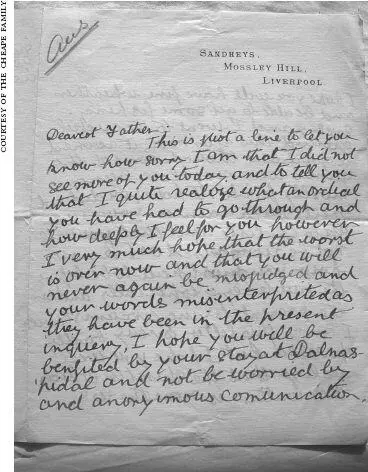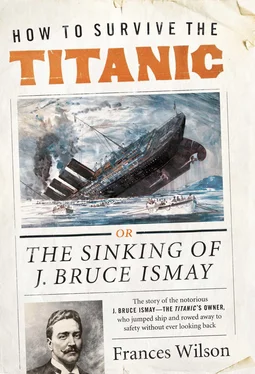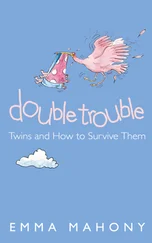He did not want his wife’s easy sympathy; he was appalled by her suggestion that the disaster would bring them closer together. However hard she tried, Florence, he believed, could never understand what he had experienced because she had not been there. Their marriage had changed after the death of their eldest son in 1891 — neither had recovered from the shock and grief — and here was Marian Thayer offering to console him over the death of 1,500 people. Florence now made a decision she would later regret: the Titanic was never to be mentioned again in her husband’s presence. He was not to be allowed or encouraged to talk about the ship, the whole thing was to be forgotten. In addition, Florence decided that Bruce had behaved impeccably. She was not going to face the world as the wife of a coward. As Conrad put it in Victory, ‘the last thing a woman will consent to discover in a man who she loves, or on whom she simply depends, is want of courage’.
Mrs Thayer replied to Ismay’s first letter with a long and ‘splendid’ one of her own; so long indeed that she feared he would be disinclined to read it all the way through. Everyone is being very kind to her, she says, but she thinks she will have to give up their wonderful house, and she doubts that she and Ismay will ever meet again. Ismay, who read her letter through many times, waited until Florence had gone out before settling down to compose his reply. ‘My wife has gone to church and I am sitting writing to you by the open window, looking over the garden. Oh, how I wish you were here and we could sit out in the garden and help each other. It would be lovely. I feel, now, that you are very close to me. I wonder if you are.’ Ismay was desperate to talk about the Titanic ; he fell upon Mrs Thayer as he fell upon the journalists at the Waldorf-Astoria when he felt misrepresented by Senator Smith. For a man whose ‘watertight compartments’, as Forster said of Lucy Honeychurch in A Room with a View, ‘never broke down’, Ismay often finds it hard to contain himself. ‘How I wish I were near you,’ he says to Mrs Thayer again; ‘I know I would never be angry or vexed by anything you said.’ It is wonderful, he feels, that he can open up to her like this. ‘Really at times the outlook for the future is very very black,’ he continues, ‘and I wonder if I can face it. Everyone here is most kind and sympathetic but I feel my heart and spirit are broken and feel at times I must give in. But why mention my troubles.’ He is sending her some lines which he tells her to put on her own dressing table:
With cheerful steps the path of duty run
God nothing does, nor suffers to be done,
But thou thyself wouldst do it, could thou see
The end of all events as well as he.
Engraved on the silver frame are Ismay’s initials and Marian Thayer’s, and the date the Titanic went down. Ismay is ‘absolutely certain’ that they will meet again, ‘and perhaps sooner than you think’. The most ‘difficult thing’, he explains, is ‘taking some interest in [my] surroundings… I cannot interest myself in anything. My mind seems to refuse to retain anything but the recollection of that awful disaster.’ Time will help, he continues to hope. On lighter matters he wonders if she has seen Philip Franklin lately — ‘What a truly splendid man he is — loyal and true’ — and whether young Jack — ‘a boy to be proud of’ — has now gone to college? His letter is becoming too long, he will be boring her, ‘but you must forgive me as I feel it is the next best thing to talking to you’.
On 31 May, Marian Thayer and her relation, Florence Cumings — who also lost her husband on the Titanic –go to a luncheon given by Madeleine Astor, the teenage widow of John Jacob Astor. The guests of honour are Captain Rostron and Dr McGhee of the Carpathia., but it is unlikely that Mrs Thayer shares with either man her knowledge of Ismay’s current state of mind. She gives the doctor a gold cigarette case and Mrs Astor presents Rostron with a gold watch. The following day, the Captain and the doctor accompany Mrs Thayer back to her home in Philadelphia, where she holds a dinner for them and includes amongst the guests several other Titanic widows. Mrs Thayer belongs to a community of grief.
In London, the British Board of Trade inquiry into the wreck has been in progress since 2 May, but Ismay does not make his first appearance on the witness stand until 5 June. He follows the proceedings in the press, but does not mention the inquiry to Mrs Thayer until his ordeal is over. His next letter is written on 18 June, when he is staying at his brother’s Scottish hunting lodge. ‘Of course I could not misunderstand anything you write,’ he reassures her. ‘You must never think of such a thing and I hope you will always write me exactly as you feel.’ He hopes she is taking an ‘interest in matters’ and admits he has ‘been very depressed lately’. He has ‘lost all desire for living’ and sees ‘no future’ for himself. He says that he is sorry that she was ‘asked to give evidence’ to the Senate inquiry and regrets that ‘it must have been very trying’. In her affidavit, Mrs Thayer had described ‘rowing continuously for nearly five hours’.
Ismay has been in Scotland for ten days now. ‘It is the wildest place you can imagine and you never see a soul. I spend my time fishing and walking and am not tempted to do any work. I could not do so if I wished to. The doctor tells me the strain I have been through has affected my heart and it will be a long time until it recovers. Any ambitions I had are entirely gone and my life’s work is ruined.’ He speaks of the loss of his future ambitions, but he had no future ambitions; Ismay had planned to retire the following year. He tells Mrs Thayer that ‘I can never again take any interest in business and I never want to see a ship again, and I loved them so and took such an interest in the captains and the officers. What an ending to my life. Perhaps I was too proud of the ships and this is my punishment. If so it is a heavy one.’ He is sinking into himself; he has reduced the enormity of the disaster to a personal tragedy, a blight on the quality of his life. The only other life it has affected is Mrs Thayer’s, but her pain is nothing compared to his. She is not hiding out in a hunting lodge in Scotland; she can at least show her lovely sad face to the world; she is not being blamed for the whole thing. He will send her a photograph of himself as she requests, but he dislikes being photographed and has only one picture which was taken a few years ago. She is in his ‘thoughts’ and he invites her to ‘come to see us’ when she is next in England; ‘It would be such a pleasure’. He closes by apologising for having ‘bored’ her with ‘such a long letter but it is the next best thing to talking to you’, and repeats that he is certain they will meet again.

During his stay in Scotland, Ismay receives a nervous letter from his son Tom, who at seventeen is the same age as Jack Thayer. ‘I very much hope that the worst is over now, and that you will never again be misjudged and your words misinterpreted,’ Tom writes to the man who rejected him when he was left crippled by polio. He also hopes that while his father is in Scotland, he will ‘not be recognised’ or ‘worried by any anonymous communications… I know this letter is very badly expressed, but I hope you will realise the spirit in which it is written is none the less sincere for that.’
Ismay now hears about an isolated house by the sea in Galway, on the west coast of Ireland. It is wild, has superb salmon fishing, and is on the market. He buys it, sight unseen: Ireland, where the Titanic was born, will be his future.
Читать дальше













